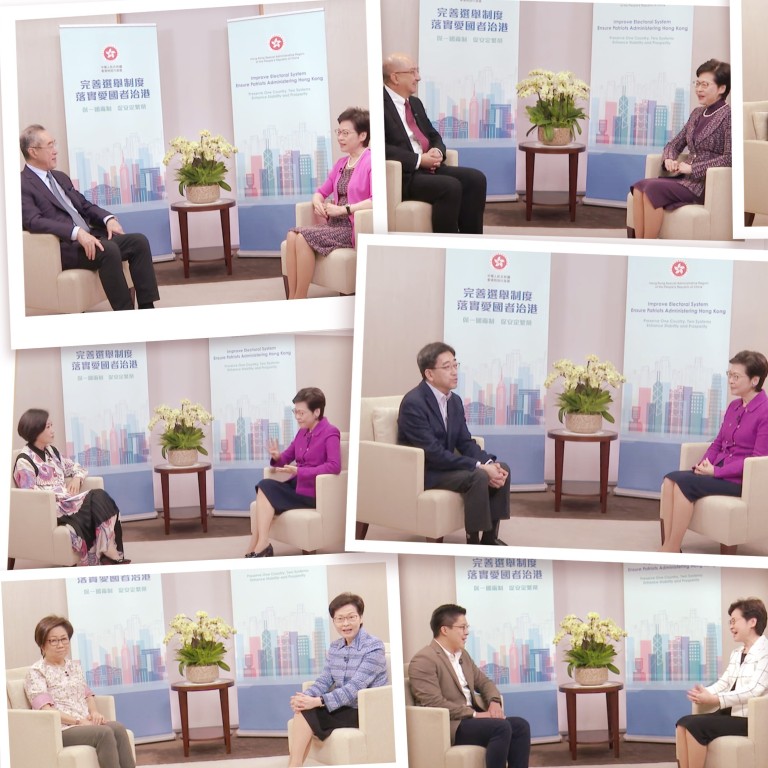
Hong Kong electoral reforms: Carrie Lam the TV host – did she nail it or was talk show a propaganda bid?
- Forty-episode RTHK series ‘did little to explain major issues or address citizens’ concerns’
- Chief Executive’s Office insists TV shows helped to inform Hongkongers and were widely reported
It was a first, when Chief Executive Carrie Lam Cheng Yuet-ngor hosted a 40-part television show to explain Beijing’s massive overhaul of Hong Kong’s electoral systems.
The series, Get to Know the Election Committee Subsectors, comprised short episodes of 10 to 13 minutes each, featuring the city leader chatting with a parade of prominent guests.
They were from all 40 industries represented on the Election Committee which selects the city’s leader. In the revamp of the city’s electoral systems, the committee has been expanded, given new responsibilities and become more powerful.
Carrie Lam heaps praise on Hong Kong electoral overhaul on debut TV talk show
It was the first time a Hong Kong leader had hosted a television series. But Lam’s effort has been panned by media experts and pro-establishment scholars, who said it came across as propaganda and achieved little beyond showing Lam heaping praise on Beijing and defending the political changes, with little attempt to explain the issues to Hongkongers or address their concerns.
Her sharpest critics said Lam merely exploited the opportunity to promote herself ahead of next year’s chief executive election.
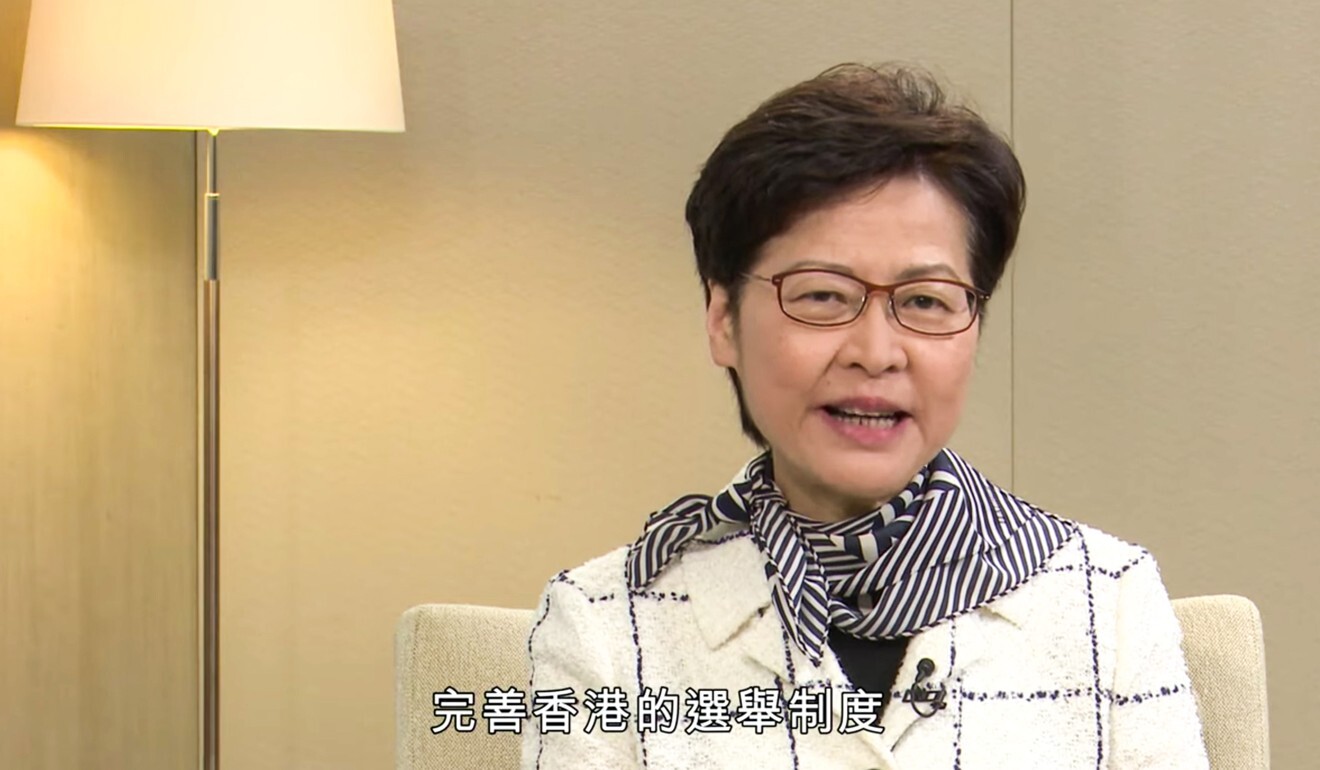
Neither public broadcaster RTHK, which aired the series, nor Lam’s office released viewership figures, but recorded shows uploaded on YouTube drew fewer than 5,000 viewers for most episodes.
The exception was the episode when veteran artist Liza Wang Ming-chun, chairwoman of the Cantonese opera performers’ group Barwo, appeared and asked Lam why the number of seats for her sector in the Election Committee had been reduced. That drew more than 60,000 views on YouTube.
Beijing loyalist hopes to be voice for Hong Kong’s young on Election Committee
“The changes to the Election Committee were a very complicated matter, but Lam failed to introduce these changes on the show,” said veteran communications strategist Andy Ho On-tat.
In the very first episode, he said, Lam’s guest was Professor Wong Yuk-shan, a local deputy to the country’s top legislature, the National People’s Congress (NPC), as well as a member of the Basic Law Committee.
Ho said Lam opened by saying Wong could have three votes in the Election Committee, without explaining the system or what had changed.
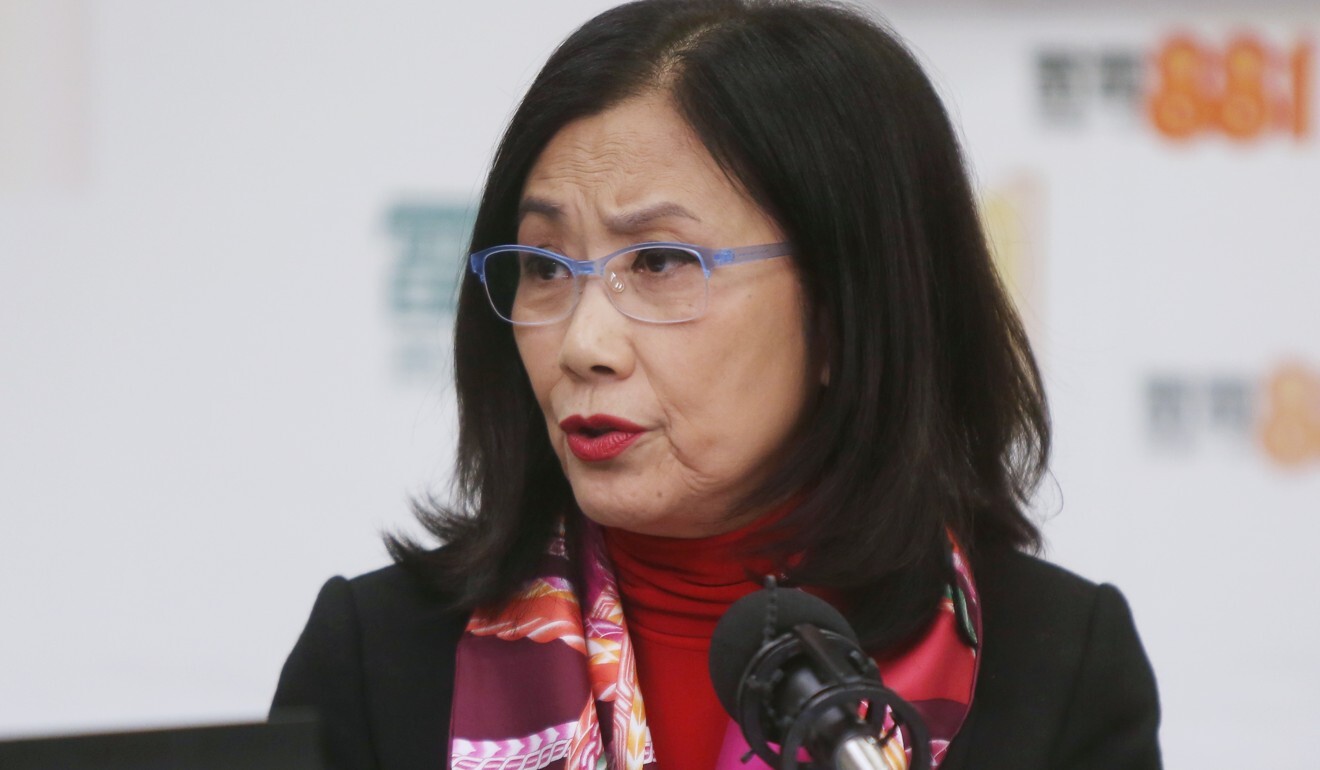
“It was hardly comprehensible to the general public, unless her target audience was someone else,” said Ho, who served as former chief executive Donald Tsang Yam-kuen’s information coordinator from 2006 to 2012.
Without proper background information, including charts and explanations, he said, Lam’s chat with Wong only reinforced the impression that Hong Kong’s system was elitist and its processes had little to do with most ordinary Hongkongers.
“Ultimately, people are left thinking that instead of promoting the electoral changes, Lam used the platform to promote herself and reach out to her prospective electors, especially with the chief executive election approaching,” Ho said.
Carrie Lam ‘most liberal-minded’ leader Hong Kong has ever had: top adviser
Lam wasted opportunity to explain
In March this year, Beijing initiated a major revamp of Hong Kong’s electoral system which saw the Election Committee expanded from a 1,200-member body to a 1,500-strong electoral college with wide new powers.
The committee’s main task previously was to pick the chief executive. Now its five subsectors will endorse candidates to run for elections, and also select 40 of its own members to the 90-seat Legislative Council.

The committee’s composition has been changed too, with the creation of a new subsector of 300 members comprising representatives of pro-Beijing groups.
Lam’s series aired on RTHK’s TV31 channel from April 28 to May 17, and her guests included former chief secretary Henry Tang Ying-yen, former ministers as well as current executive councillors and lawmakers.
Observers said if Lam was serious about explaining the changes to Hongkongers, she could have taken a leaf from other countries, and held district-level discussions, or used social media and even entertainment shows to draw young people.
Francis Lee Lap-fung, director of Chinese University’s school of journalism and communication, said most government leaders would prefer attending media interviews instead of hosting television programmes which could come across as propaganda.
He felt it would have been more effective for Lam to be open to accepting interviews from media organisations.
“The public would at least feel it’s not a kind of advertising or self-promotion, and she might even be able to improve her popularity,” he said.
According to the latest poll by the Hong Kong Public Opinion Research Institute, Lam’s approval rate was only 18 per cent in April.
Why did China’s vice-premier travel south to meet Hong Kong leader Carrie Lam?
Writing on the pro-establishment website Speak Out HK, prominent columnist Chris Wat Wing-yin criticised Lam, saying the city’s leader had taken advantage of her position to interview Election Committee members who will elect the next chief executive.
Citing RTHK TV 31’s average viewership, she estimated that barely 6,500 people watched the show each day.
The episodes uploaded on RTHK’s YouTube channel drew 7,000 to 8,000 viewers initially before dwindling to below 5,000 on most days, except for the most-watched episode with Liza Wang.
A spokesman for the Chief Executive’s Office said the series was produced by the government’s information department and coordinated by Lam’s office, and did not incur extra production costs.
Without disclosing viewership numbers, the spokesman said the series improved the public’s understanding of the electoral changes as reports of the content were carried by different media. Hongkongers could also watch the episodes on RTHK, government websites and social media platforms.
A spokesman for the Constitutional and Mainland Affairs Bureau said the changes to the electoral system were also being explained through television clips, banners and advertisements in various media, as well as information booklets and dedicated websites. These have cost around HK$5 million (US$644,000) in total, the spokesman said.
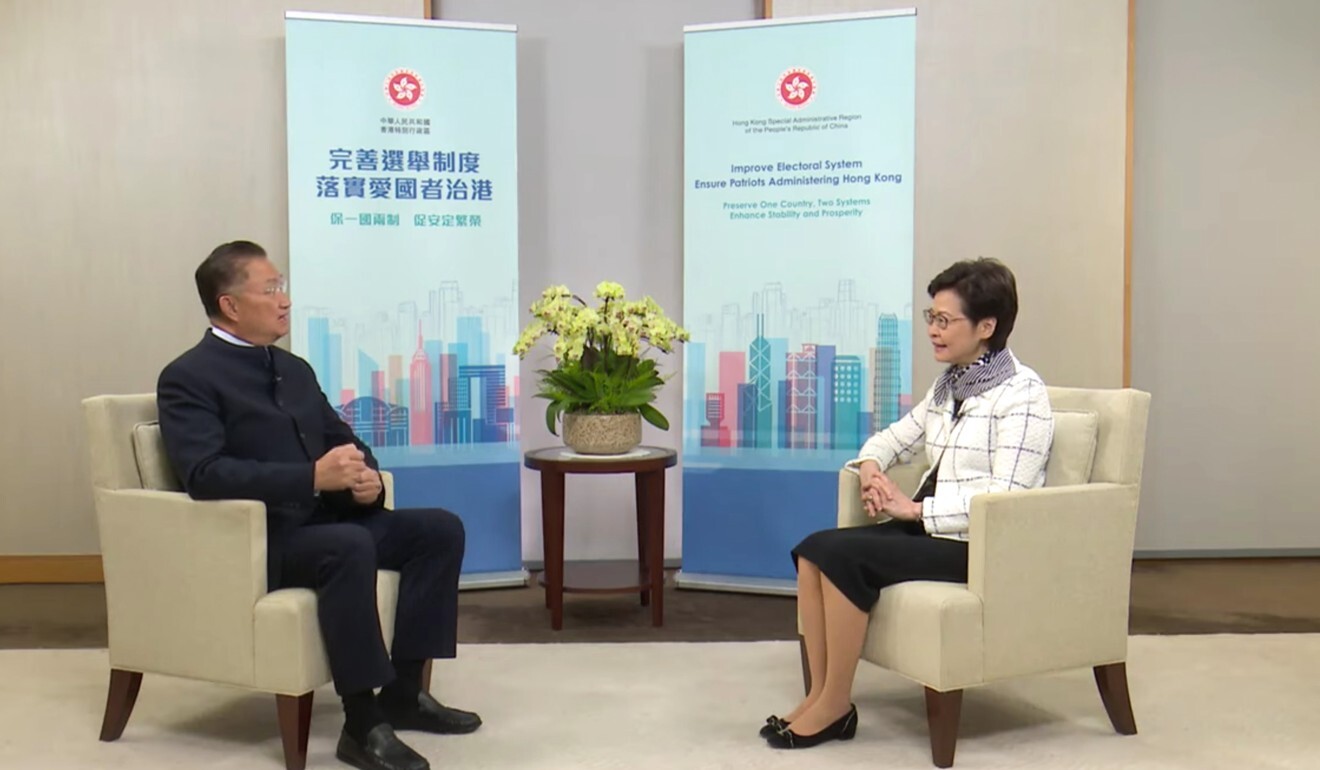
‘No meaningful discussion of issues’
Lau Siu-kai, vice-chairman of the semi-official Beijing think tank the Chinese Association of Hong Kong and Macau Studies, said the low viewership made Lam’s series “meaningless”.
“The show has not generated any meaningful discussion in society,” he said. “On the other hand, people might criticise her for using public resources to promote herself, as she might be running for a second term.”
Over the past decade, former leaders have tried various media tactics to promote political reforms or resolve controversial issues.

In a last-ditch attempt to promote a constitutional reform package in 2010, then leader Donald Tsang Yam-kuen led his political team to the streets to drum up public support. Ministers were seen riding open-top buses, chanting slogans and visiting homes.
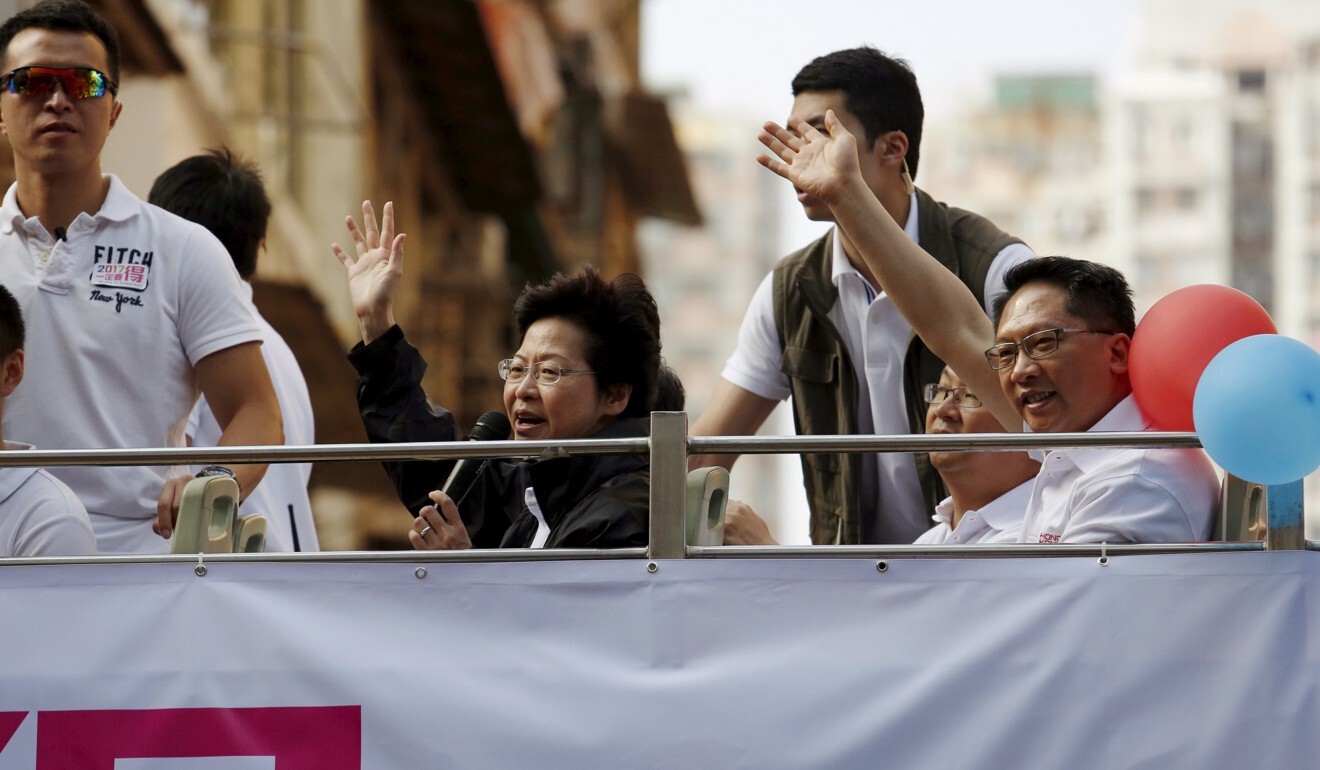
This time, Lam chose to host her own television series, instead of distributing pamphlets across Hong Kong, making televised announcements or setting up a dedicated website.
Lau said community visits might be a waste of time and resources in the current political climate, but suggested that the government follow the Singapore government’s use of district-level discussions to explain issues to people and get feedback.
“Political parties and groups in Singapore regularly arrange meetings with the general public and various sectors to hear from them on public policies, and flag opinions to the government,” he said. “The pro-establishment camp in Hong Kong should set up similar mechanisms to gather public opinion.
“To push forward controversial policies, the government cannot simply rely on a few ministers and the chief executive to fight alone. It requires the efforts of the whole government to educate the public.”
Chinese University’s Francis Lee said Hong Kong’s leaders could learn from politicians in other countries who engaged popular media and even entertainment channels to boost their popularity, especially during periods when there were no crises.

He cited Taiwan’s leader Tsai Ing-wen as someone adept at using social media and connecting with key opinion leaders to promote herself and the government.
He added that former United States president Barack Obama and his wife Michelle were frequent guests on popular talk shows, and Americans did not find it odd when he turned up on, say, the Ellen DeGeneres Show, and discussed controversial health care policies with the host.
“These kinds of interactions with the public have to be done frequently and regularly, so leaders can build up their image as being open-minded and down-to-earth,” Lee said. “It’s time for future leaders in Hong Kong to really communicate with the people.”

